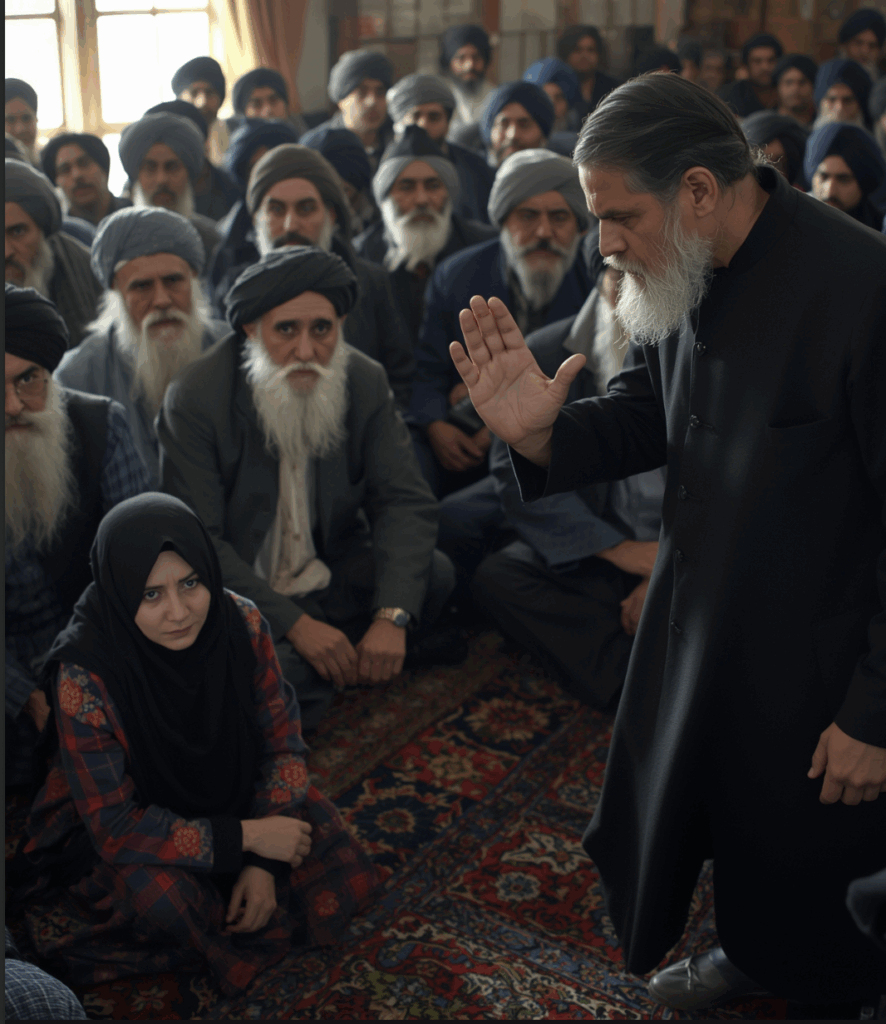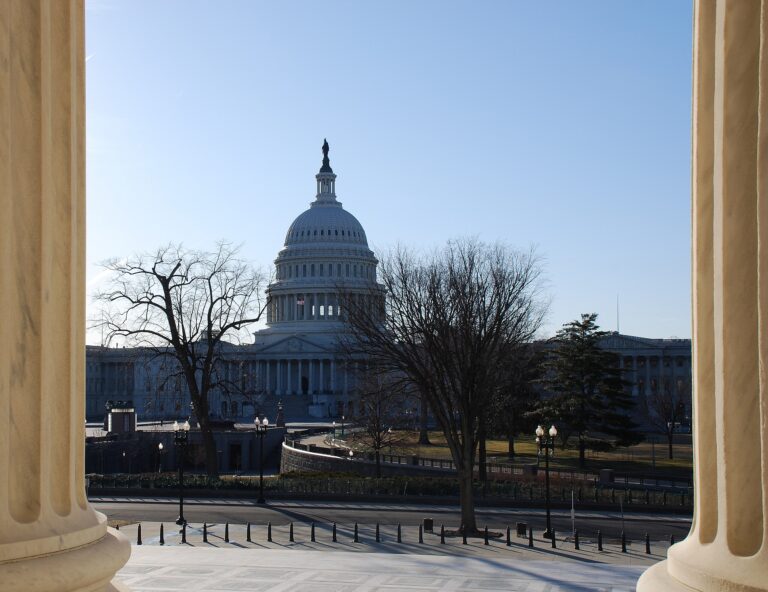
Jirgas: Rogue Agents of Conflict Resolution
Jo Chitlik
This image is an AI-generated depiction based on descriptions of similar events.
The recent renewed public outrage over a video showing the brutal execution of Bano Bibi and her alleged partner, Ehsan Ullah, has once again brought the issue of honor killings to the forefront. These murders, which were ordered in May 2025 by a local Jirga council in Pakistan’s Balochistan Province, highlight the profound illegality and moral bankruptcy of this parallel justice system. “The woman’s family and tribe members were allegedly involved in the murder as they killed her and her partner for allegedly having a relationship out of wedlock.” The man who shot Bano, numerous times, was none other than her own brother. According to the Jirga, the murders were a justified means of badal–that is, of seeking justice or revenge against the wrongdoer–to restore the family’s “honor.”
Both Bano Bibi and Ehsan Ullah, had children from previous marriages, who are now left without a parent. This tragic event, and its devastating consequences, underscores the urgent need to examine the Jirga system. The Jirga system represents a traditional, yet often informal, form of conflict resolution and governance that operates parallel to Pakistan’s formal legal framework. This system continues to operate with a high degree of impunity in certain regions of Pakistan, perpetuating violence against both women and men. This is especially concerning in a nation already grappling with high levels of gender-based violence. The situation becomes even more complex as Pakistan attempts to formally incorporate alternative dispute resolution mechanisms into its justice system to address judicial backlogs, while simultaneously trying to uphold the traditional customs and beliefs that are an integral part of Pakistani society.
This article provides a comprehensive analysis of the Jirga system in Pakistan, examining its role as a deeply entrenched customary practice that operates parallel to the formal legal framework. This analysis traces the historical development of Jirgas—from ancient origins to modern applications—and explores why some communities prefer them to conventional courts. The article distinguishes the Jirga system from formal alternative dispute resolution (ADR) mechanisms, highlighting their fundamental differences. We then exercise the case of Bano Bibi to raise critical questions about the state’s implicit sanction of these resolutions, especially when they result in horrific acts often mislabeled as honor killings. The discussion further probes whether Jirga decisions align with the principles of the Quran and how Pakistan’s legal system has attempted to address so-called “honor killings”, through existing legislation. Finally, the article considers the impact of social media in exposing these atrocities and asks what steps Pakistan should take to move forward in light of this increased public awareness.
Origins of the Jirga System
The historical roots of the Jirga system are deeply embedded in the tribal societies of Afghanistan and Pakistan. Jirgas traditionally make consensual decisions according to the Pashtun social code, known as Pashtunwali, which emphasizes honor, hospitality, and justice. When honor is not restored, it is believed that the dignity of a man and his family remain violated unless proper badal (justice or revenge) is carried out. The Jirga system is primarily practiced among the Pashtun community, a predominantly Sunni Muslim ethnic group. While the precise origins of the jirga remain somewhat obscure, it is widely believed that the tradition dates back to ancient Indo-Iranian tribes.
These ancient tribes are thought to have practiced similar systems of tribal councils. The modern Jirga bears a distinct resemblance to historical councils such as the sabha (a council of elders), an assembly or council found in ancient Vedic societies. Fundamentally, the current Jirga system is an evolution of these ancient systems, convening an all-male council, community members or religious leaders, sometimes with the involvement of family members, who gather to discuss and resolve disputes, making decisions on important matters in an effort to maintain social order and norms within their communities. These communities are not only comfortable with Jirga councils but trust them explicitly to resolve their disputes, preferring them over the formal Pakistani justice system for a variety of reasons, including easy access and a general distrust of the courts.
Jirga versus Alternative Dispute Resolution (ADR)
The concept of Jirga is widely believed to be inspired by the Islamic concept of shura. This Arabic term refers to the act of collective decision-making through consultation. Sunni Muslims, in particular, hold the belief that Islam mandates decisions made by Muslim societies to be arrived at through shura. This principle aligns itself with the Quranic teaching that encourages Muslims to decide their affairs in consultation with one another. A key verse often cited in this context references those “who respond to their Lord, establish prayer, conduct their affairs by mutual consultation, and donate from what We have provided for them” (Quran 42:38).
As such, shura as a concept is generally regarded as a positive activity, often employed to organize religious and communal affairs in a harmonious peaceful manner. Therefore, if the Jirga is used in its ideal format, theoretically, it should draw upon this Islamic principle of collective wisdom and consensus to reach viable solutions.
The Jirga system has been loosely compared to Alternative Dispute Resolution (ADR) mechanisms due to its stated purpose of aiding in the resolution of disputes outside formal courts. While it can be argued that the Jirga system, as a concept, shares some superficial resemblances with ADR namely, its focus on resolving conflicts through mediation and consensus, and its modern application often deviates significantly, operating in a manner that is outside of Islamic fundamental principles, or even in direct contravention with Articles 9, 14, 25, 34 of the Pakistani Constitution. Additionally, concerns have been raised regarding potential biases against women and minorities, a lack of codified rules, and the possibility of decisions violating fundamental human rights.
The fundamental distinction between the two lies in their relationship with the existing legal system. ADR mechanisms, such as mediation, arbitration, and conciliation, work in tandem with the formal legal system, adhering to the rule of law. In the case of Muslim countries, ADR adheres to Islamic principles which have been duly codified or are part of settled case law. They provide avenues for dispute resolution that are recognized, regulated, and often enforceable within the legal framework, ensuring that the rights of the parties are upheld during the process. More importantly, ADR operates on the basis of voluntary participation and mutual consent of the parties directly involved. Without adherence to these fundamental principles, you cannot have ADR. A Jirga council does not require consent of the parties; it will move forward with a claim based entirely upon third parties. Depending on the case and the power dynamics at play, the Jirga system often usurps the authority of the state’s police and judiciary. By not adhering to the Pakistani’s formal system of regulations, it also bypasses the formal Sharia Court and secular court systems. Jirga’s frequently address issues over which they lack jurisdiction, reaching verdicts that are entirely outside the legal justice system, often without any deference to statutory law, constitutional rights, human rights principles or Pakistan’s international commitments. This parallel process, particularly when it leads to extrajudicial punishments, such as death, renders it fundamentally different and in direct opposition to the goals of a legitimate ADR process, whose overarching goal is to reach an amicable settlement where both parties reach a win-win solution.
Jirgas and “Honor Killings” in Pakistani Law
The case of Bano Bibi tragically highlights some of the most egregious abuses of the Jirga system: the ordering of so-called premeditated “honor killings.” This is just one example of practices embedded within the Jirga system, which lie outside of the Pakistani legal system. The Jirga system, while sometimes seen as a traditional means of dispute resolution, unfortunately harbors numerous practices that undermine Pakistan’s rule of law. Among these is the deeply perverted custom of vani (or sawara), which involves the settlement of claims through forced female marriage or the act of being given in servitude. The practice, often used to settle debts acquired by the males in the family, or other such disputes, is compounded by the alarming frequency with which the female trafficked in the transaction is often a minor, or even a small child. Naturally female consent in this trade is not present, since a large number of cases involve children who, due to their age, are incapable of providing informed consent.
Honor killing, locally known as karo-kari which originates in Sindh, Pakistan, is a practice perpetrated under the guise of upholding family or tribal honor. These acts are, in fact, unsanctioned, premeditated murders which are usually carried out by close family members. These acts have no basis in Islamic law or any civilized legal system. The term honor killing is a misnomer, because there is no honor in taking a defenseless human life, whether male or female. Instead, these are acts of violence and the ultimate betrayal of family trust. They represent a severe violation of fundamental human rights and contradict every international commitment signed by the countries where this is allowed to occur. Simply put, honor killings are murder, committed by family or community members who believe the victim has brought dishonor through perceived immoral behavior. The truth or falsity of the allegations is irrelevant, as local councils (Jirgas) are not designed to be fact finders or truth seekers. Jirgas are also not held to ethical professional standards, like a judge or a mediator would be. Instead, they operate completely unaccountable to anyone, wielding an enormous amount of power that no one should possess outside of the legal system.
These murders, perpetrated primarily against vulnerable and defenseless Pakistani women, do not follow a process established with a burden of proof system, since mere perception (true or not) that the victim has brought dishonor is enough to trigger the punishment of death. Due process and the guarantees enveloped within the concept are nonexistent to the parties who become victims of these Jirgas. Varied interpretations of the council’s code and the nonexistence of a standardized process, allow for variation in the application among the different tribes, the sanctioned behaviors leading to these killings can range from alleged marital infidelity or rules regarding refusing of an arranged marriage, having premarital relationships or a female choosing her own spouse (love marriage).
While the Quran does provide clear guidelines and established processes for the various enumerated acts, the core discussion here is not whether a society should sanction any of the described acts. Instead, the discussion should focus on who within an established Islamic society possesses the legal authority to review and rule on the legitimacy of the act, should the need arise. This distinction is crucial, as it shifts the debate from the morality or permissibility of an act to the procedural and jurisdictional aspects of its enforcement within an Islamic legal framework.
It’s challenging to pinpoint the exact number of karo-kari (honor killings) that occur annually in Pakistan due to significant underreporting. The unchecked authority of these Jirgas silences these communities and especially women, who prefer to remain silent when the mere assumption of impropriety brings the possibility of death. While human rights organizations estimate approximately 1,000 such deaths each year in Pakistan, it is believed this figure is a conservative representation of a much grimmer reality. More so, it does not consider the full scope of the issue: which are the high levels of violence against Pakistani women.
Jirgas versus Sharia Law
It’s crucial to understand that a Jirga does not impose Sharia law. While a Jirga may incorporate Islamic principles and even include an Ulama, it is not synonymous with the formal legal system of Sharia Courts.
Sharia law, derived from the Quran and the teachings of the Prophet Muhammad in the Sunnah, is a comprehensive legal framework that is carefully enshrined within the formal system of Sharia Courts. Sharia Courts operate with established procedures, highly specialized qadis (Sharia judges), and use fiqh (Islamic jurisprudence). Their rulings are based on specific legal texts and court precedents, aiming to provide a consistent and authoritative application of Islamic law.
In contrast, a Jirga is typically informal, consensus-based tribal assembly. Its decisions rely on local customs, traditional codes of conduct (like Pashtunwali), and community elders, alongside general Islamic ethics. While participants may invoke Islamic principles during deliberations, a Jirga lacks the structured process, and formality of a Sharia Court. As such, their rulings tend to be inconsistent with the Quran. They function more as an informal dispute resolution process rooted in varying community traditions, rather than an established ADR methodology.
Understanding this distinction is vital to avoid mischaracterizing the valuable contributions of Pakistani Sharia Courts to Islamic law and mislabeling the Jirga process as ADR.
The Jirga system is popular among these minority communities because it provides swift, accessible, and cost-effective justice, drawing legitimacy from community elders and local traditions. However, challenges arise when customary practices within the Jirga contradict specific provisions of Sharia and secular Pakistani law, particularly concerning human rights and women’s rights. Most Jirga practices are not found in the Quran or supported by Islamic teachings. In the area of marriage, Islamic teachings emphasize consent and prohibit forced marriages: “O believers! It is not permissible for you to inherit women against their will” (Surah An- Nisa 4:19)
Despite these potential inconsistencies, Pakistan is trying to bridge the gap between the two systems, due to the historical value that Jirgas have played in their society. Some proponents argue for integrating the Jirga into formal justice systems as a form of alternative dispute resolution (ADR), provided it is overhauled to comply with Islamic, secular, and constitutional Pakistani law, as well as international human rights principles. This would involve training Jirga members in fiqh (Islamic jurisprudence) and ensuring greater gender inclusivity, but above all it would call for judicial oversight. Jirgas would no longer be allowed to act with impunity.
Pakistan’s Stance on Honor Killing: A Legal and Constitutional Perspective
Pakistan unequivocally condemns honor killing. Beyond specific laws, the Pakistani judiciary has consistently challenged and dismantled systems that perpetuate honor killings. The parallel Jirga (a council of male elders that resolves disputes and makes decisions based on traditional social code) and Panchayat (a council that is an assembly of five) systems, often responsible for sanctioning such acts, have been repeatedly declared illegal and unconstitutional by Pakistani superior courts.
A landmark judgment by the Sindh High Court in 2004 initially declared the jirga system illegal, compelling police to prevent their gatherings. This was reinforced in 2006 when the Supreme Court of Pakistan outlawed Jirgas nationwide. The apex court further solidified its stance in 2017, with a three-member bench, headed by then-acting Chief Justice Sheikh Azmat Saeed, declaring both Jirgas and Panchayats unconstitutional and illegal. This ruling emphasized that these traditional councils violate several articles of the Pakistani Constitution, including the rights to life, liberty, and a fair trial, and that they operate outside the parameters of the law. Critically, this decision addressed concerns about jirgas contributing to social issues like honor killings and the exchange of women and children in marriage to settle disputes. More importantly, it reinforced the supremacy of the formal legal system in Pakistan, stressing that all disputes must be resolved through established legal procedures.
The judicial commitment against these parallel systems was reaffirmed in 2019 by former Chief Justice of Pakistan Mian Saqib Nisar. Heading a two-member bench, he once again declared Jirgas and Panchayats illegal and unconstitutional, citing violations of Articles 4, 6, 8, 10A, 25, and 175A of the Pakistani Constitution. His ruling meticulously defined the permissible scope of Jirgas, limiting them strictly to minor civil disputes and explicitly prohibiting their intrusion into the legal jurisdiction of Pakistani courts, especially concerning criminal cases. This ruling allows Jirgas to function solely as forums for arbitration, mediation, or negotiation, strictly forbidding them from usurping the jurisdiction of ordinary courts of law (civil or criminal).
Furthermore, the Supreme Court, under Chief Justice Nisar, highlighted that the Jirga system violates Pakistan’s international obligations, specifically referencing the Universal Declaration of Human Rights (UDHR) and the International Covenant on Civil and Political Rights (ICCPR). These judicial rulings consistently aim to establish the unequivocal supremacy of the Constitution and the formal judicial system in Pakistan, thereby unequivocally condemning and actively working to eradicate the practice of honor killing.
Holding Jirgas Legally Accountable: Bano Bibi’s Case Within the Context of Pakistani Law
Historically, honor killings have often gone unpunished due to loopholes in the law, societal pressures, and the influence of powerful tribal elders. Until recently, a legal provision allowed the heirs of a victim to forgive the perpetrators of the murder, which was frequently exploited in honor killing cases, enabling perpetrators to elude justice.
In response to national and international pressure, and particularly following high-profile cases, Pakistan has made legislative strides. The 2016 Anti-Honour Killing Laws (Criminal Laws Amendment) Bill was a significant step. This legislation removed the option of forgiveness (Diyat) for honor killings, making them non-compoundable offenses. It mandates life imprisonment for those convicted of honor killings, regardless of whether the victim’s family forgives the perpetrators. This amendment aimed to ensure that bad actors face severe punishment and that justice is served, even if families are coerced or pressured into forgiveness. While this legal reform is crucial, challenges remain in its implementation, including weak law enforcement, lack of awareness, and continued societal acceptance of Jirga decisions in some remote areas.
Furthermore, principles within the Quran explicitly condemn the taking of innocent life, emphasizing justice, compassion, and reaching conclusions through due process. There is no Quranic justification for honor killings. Such acts contradict the very essence of Islamic teachings on human dignity, the sanctity of life, and the prohibition of vigilantism.
The tragic case of Bano Bibi sparked a surprising public discussion on social media, largely focusing on the victims’ actions or inactions rather than the central legal question. This is often referred to as “blaming the victim.” However, the real issue is not whether Bano Bibi and Ehsan Ullah’s actions justified the outcome, but rather the legality of the Jirga Council’s actions under current Pakistani law to impose such a sanction. Regardless of the moral or religious acceptability of what Bano Bibi and Ehsan Ullah may or may not have done, the pertinent legal fact remains: did the Jirga possess the legal authority to impose the death penalty? The answer, grounded in Pakistani law and judicial precedent, is an unequivocal no.
The Way Forward for Pakistan: Upholding Justice and Protecting the Vulnerable
The horrific details of the Bano Bibi case illuminate an urgent need for Pakistan to forge a clear and decisive path forward, one that unequivocally upholds justice and protects its most vulnerable citizens. Pakistan’s Islamic beliefs deeply cherish the sanctity of the usra (family), managing family conflict and the well-being of children. The illegal decision by this Jirga in the Bano Bibi and Ehsan Ullah case has left children traumatized, bereft of a mother and father, and facing ostracization within their community.
Sparked by the awareness generated on social media, which brought this specific case and others similar to light, Pakistani police have moved swiftly to arrest 13 individuals, including Bano Bibi’s parents and the Jirga leader that ordered the murders. The gunman, however, one of Bano Bibi’s brothers, remains at large. The police expect to arrest more co-conspirators in the coming weeks.
The profound sadness that sweeps over this case is that whether Bano Bibi and Ehsan Ullah actions violated Islamic principles remains unconfirmed. The couple was never offered the respect of due process. Instead, the couple was condemned in absentia and lured to their deaths under false pretenses. Crucially, even if such an inquiry had been warranted, the proper jurisdiction for determining this lay not with a Jirga, but with Pakistan’s Sharia Courts. Sharia courts are designed to ensure due process and uphold the burden of proof through established evidentiary procedures. While the involvement of the public in what might seem like a private matter between consenting adults may perplex those in secular nations where religion does not play a part in interpersonal relationships, it is vital to acknowledge that Pakistan is first and foremost an Islamic nation. As such, Pakistan remains committed to preserving its religious traditions and social norms based on the teachings of the Quran, and this is their right as a sovereign nation. However, for Pakistan’s theocratic and secular framework to function properly and maintain global respect, it must operate strictly within the guarantees of the law, ensuring all of its citizens’ rights.
As such, Pakistan must now confront the deep-seated issues that allow such parallel systems to operate with impunity. Quite the contrary, Pakistan must act swiftly to bring to justice all the perpetrators and accomplices to this heinous crime, showing no tolerance for behavior outside of its laws.
- Strict Enforcement of Law: The primary step is the rigorous and uncompromising enforcement of the Anti-Honor Killing Laws. This requires strengthening the police and judicial systems, creating opportunities for sensitivity training, ensuring swift and transparent investigations, fair trials, and deterrent punishments for all involved in Jirga-ordered murders, including the tribal chiefs who issue the decrees.
- Judicial Oversight and Integration: While Jirgas may be useful as a traditional dispute resolution mechanism for minor civil disputes, they must operate under the strict judicial or provincial oversight and within the formal Pakistani legal system. Any Jirga decision that infringes upon fundamental rights, contravenes national law or oversteps its limited jurisdiction, must be immediately declared null and void, imposing prison sentences that dissuade the bad conduct.
- Public Awareness and Education: There is a critical need for public awareness campaigns, particularly in rural and tribal areas where literacy levels may not be at their highest. Greater effort must be made to educate communities about the illegality of Jirga-ordered punishments, the true Islamic stance against honor killings, and the rights guaranteed by the Pakistani Constitution.
- Empowerment of Women: Addressing the root causes of honor killings involves empowering Pakistani women by providing them access to basic education, combating illiteracy, developing economic opportunities, and ensuring they have access to justice. When women are economically independent and able to financially contribute to their societies or their family, they become much more aware of their rights and value in society.
- Reforming Customary Practices: A long-term strategy involves engaging with tribal communities to reform customary practices that are in conflict with human rights and national law. This is a delicate process that requires dialogue, cultural sensitivity, and the promotion of progressive interpretations of tradition.
The Bano Bibi tragedy and many other similar “honor killings”–2012 Kohistan video case, 2014 Farzana Parveen, 2016 Ambreen Riasat and 2025 Sidra Bibi–are just some that serve as a stark reminder that while the preservation of tradition and religious beliefs, does hold great value within a traditional society, it can never supersede justice, human rights, and the rule of law. Pakistan stands at a critical juncture, where it must unequivocally assert the supremacy of its legal system and protect the lives and dignity of all its citizens, ensuring that no individual falls victim to rogue agents of conflict resolution. ♦

Jo Chitlik is a U.S. Department of State Fulbright Specialist, a Senior Fellow at Emory University’s Center for the Study of Law and Religion, and Visiting Scholar at Fatima Jinnah Women’s University (FJWU) in Rawalpindi, Pakistan. Through their affiliate GlobalLearningOnline.com, Chitlik and her Emory alumni team created Pakistan’s ADR Pilot Program taught at FJWU.

Alishba Mohsin is a Pakistani Junior Research Assistant (JRA), who aided the author in collecting the research for this piece. Alishba is a rising female attorney and is part of a new pilot program in Pakistan. This program will recruit 4th and 5th-year law students and train them in legal research and analysis, addressing a significant void for law students in Pakistan, particularly those from remote areas.
Recommended Citation
Chitlik, Jo. “Jirgas: Rogue Agents of Conflict Resolution.” Canopy Forum, September 5, 2025. https://canopyforum.org/2025/09/05/jirgas-rogue-agents-of-conflict-resolution/.
Recent Posts










